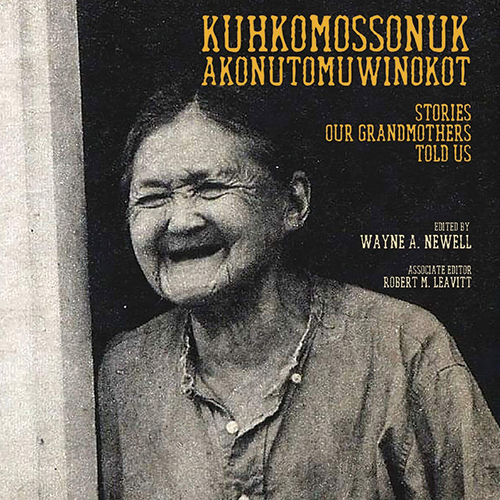Peace and Social Concerns Committee calls our attention to an exciting new book. Here’s a review from Friends Journal:

March 1, 2023
Edited by Wayne A. Newell, associate editor Robert M. Leavitt. Resolute Bear Press, 2021. 208 pages. $34.95/hardcover; $24.95/paperback; $2.99/eBook.
This collection of stories from the Passamaquoddy Indigenous community of Maine, Kuhkomossonuk Akonutomuwinokot: Stories Our Grandmothers Told Us, is a 45-year labor of love by Passamaquoddy editor Wayne Newell, who died in late 2021, several months after its publication (editor’s note: see his milestone here). He was born and grew up on Passamaquoddy lands. He founded a bilingual education program in the 1970s, served on the tribal council, and was president of the tribe’s Northeast Blueberry Company. His life intersected with Quakers when he was ten years old at a Quaker workcamp. In the 1970s, he directed American Friends Service Committee’s Wabanaki Program. In the 1980s and 1990s, he participated in “the Gatherings” with Quakers, Natives, and others to reimagine Indigenous–settler relations.
The collection is charming and engaging while also being scholarly. All stories appear in both Passamaquoddy and English with a pronunciation guide for the Passamaquoddy. There is a web address for an online Passamaquoddy Maliseet dictionary, maintained by the associate editor, that includes video recordings of native speakers using some of the words from the dictionary. The stories are also accompanied by illustrations in a variety of styles. Some of the stories were initially recorded on wax cylinders in the late-nineteenth century.
The first story, which was written in 1979, talks about daily life in the 1920s through the experience of Mary Ann, a girl roughly the age of the editor’s parents. It covers events like births and deaths, doing laundry, going to school, celebrating Halloween, and listening to stories told by her elders. This account helps readers understand how storytelling was a part of daily life. It is accompanied by a photograph of school children Mary Ann’s age with annotations identifying those children as people who grew up to help write this book.
The next group of stories are mostly about animals: ants, flies, crickets, and mice. To help readers appreciate the storytelling experience, the first story includes photographs of the storyteller gesturing with her hands and head to illustrate the story as she tells it. The photographs and drawing for that story are by the associate editor of the book, a linguist who also has been working for about a half-century on learning both these stories and the Passamaquoddy language.
The volume then turns to a series of stories about struggles between the devil and ordinary people. These are mostly trickster stories where the devil and ordinary people are trying to outsmart one another. One is a Job-like story where an angel and the devil try to win over a person to their side. In another, the devil asks an ordinary human to help split up a devoted couple. The human uses gossip to accomplish the task. The devil gives the person a bag of gold saying, “You’re more of a devil than I am.”
Another set of stories feature motewolon, which are people with extraordinary powers that are used for both good and bad purposes. They are also responsible for ghosts that sometimes cause trouble, often inspire fear, and at other times are simply mysterious.
The final collection is titled “Passamaquoddy Stories.” The protagonist for most of them is a superhero called Koluskap. In one tale, Koluskap tracks down a huge owl that is making the world too windy by flapping its wings. Koluskap puts the owl in a crevice, so it cannot flap its wings. Then the air becomes too calm. Koluskap extracts the owl in a way that permits it to flap only one wing. The result is the intermittent windiness of modern times. Humans are fearful of the power of Koluskap, but usually those powers are used to benefit them.
Koluskap is also the protagonist in Aladdin-style stories of fulfilling human wishes that lead to unexpected results. For example, a man who wishes to be loved by women is accosted by young women who literally smother him with their attention resulting in his death. The story ends with this statement: “What happened to the maidens is not known.”
The book gives readers insights into several aspects of Passamaquoddy culture as well as an appreciation for the imaginative creativity of that culture.
David Etheridge is a member of Friends Meeting of Washington (D.C.), clerk of the Baltimore Yearly Meeting Working Group on Racism, and previously worked for over 20 years as an attorney in the Indian Affairs Division of the Solicitor’s Office of the U.S. Department of the Interior.

Pingback: We Gather on Land That Is a Homeland for the Wabanaki | Durham Friends Meeting (Quaker)